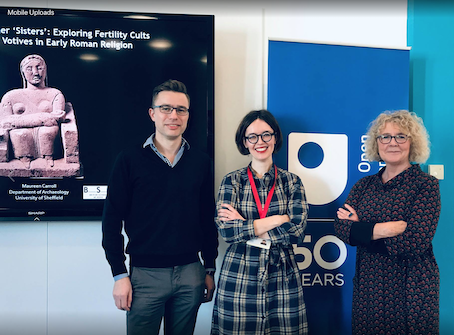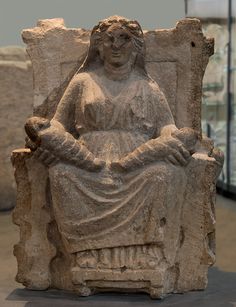By Jessica Hughes, Senior Lecturer in Classical Studies
This Spring sees the launch of a new research centre at The Open University, which involves some exciting collaborations between the Departments of Classical Studies and Religious Studies. The Baron Thyssen Centre for the Study of Ancient Material Religion builds on a long tradition of OU research in the areas of material religion and lived religion, as well as sensory approaches to sacred spaces and rituals. The Centre is based in the Department of Classical Studies, so its main focus will be ancient Greek, Roman and Etruscan material religion: nevertheless, one of our primary aims is to bring this ancient Mediterranean evidence into a productive dialogue with work on religious material culture in other periods and places, so we’ll be working closely with colleagues in Religious Studies and Art History, in order to gain a deeper understanding of the ways in which religion happens though material things – including objects, bodies and places.

Left to right: Professor James Robson (Head of School of Arts & Cultures, and member of the new Centre steering committee); Dr Jessica Hughes (Centre director); Professor Maureen Carroll (our guest speaker for the inaugural seminar of the Baron Thyssen Centre for the Study of Ancient Material Religion).
The Centre’s inaugural seminar last month was a fantastic start to our activities, and already showed how valuable such cross-disciplinary dialogue can be. Professor Maureen Carroll from the University of Sheffield joined us in Milton Keynes to give a talk on ‘Mater Matuta and her Sisters: Exploring Fertility Cults and Associated Votives in Early Roman Religion’. This seminar presented some of the results of Professor Carroll’s recent fellowship at the British School at Rome, including a new interpretation of the famous tufa statues from the sanctuary at Capua in Southern Italy. Afterwards, we recorded a panel discussion about votive offerings related to fertility and early infancy, featuring Dr Emma-Jayne Graham from Classical Studies (who talked about anatomical votives from sites in ancient Italy), Dr Marion Bowman from Religious Studies (who shared her research on the cult of St Gerard Majella in Newfoundland), and the artist Tabitha Moses, whose work has drawn powerfully on the imagery and concept of votive offerings. As well as sharing material from our own research or artistic practice, we explored how votives related to the broader themes of relationality and materiality, and how these objects help(ed) people to forge relationships – both with divine beings, and with each other – during the often anxious times of pregnancy and childbirth.
The recording of this discussion is available on the Centre website and embedded below, and we will be sharing more resources like this over the coming months. The Centre website also lists our upcoming events, including our official launch celebration, which will take place in Senate House in London on the evening of Monday 25th March. The programme for the evening features a keynote talk by Professor Esther Eidinow entitled “Magic: mind, material, metaphor”, and a joint presentation about the Centre’s work by members of the steering committee. Like all our events, this one is free to attend, and open to everyone, and we really hope that some readers of this blog will be able to join us! Also this month we will host a seminar in Milton Keynes by Dr Jody Cundy of Oxford University, who will be talking about votive offerings in Greek literary texts and inscriptions (21st March), and a ‘networking day’ in Camden Town, London (3rd April), which has a packed programme of talks and round table discussions, including a session led by Professor Graham Harvey and Dr Ailsa Hunt entitled ‘Ancient Trees, Contemporary Rivers: what does animism have to do with our environmental crisis?’.
We are very grateful to Baron Lorne Thyssen-Bornemisza for his generous support of the Centre, and we look forward to sharing more news of our research activities with you all in the future. Please do come and join any of our seminars or workshops, or tune into the website and Twitter account (@OpenMatRel) to follow our progress and discover our latest multimedia resources.

